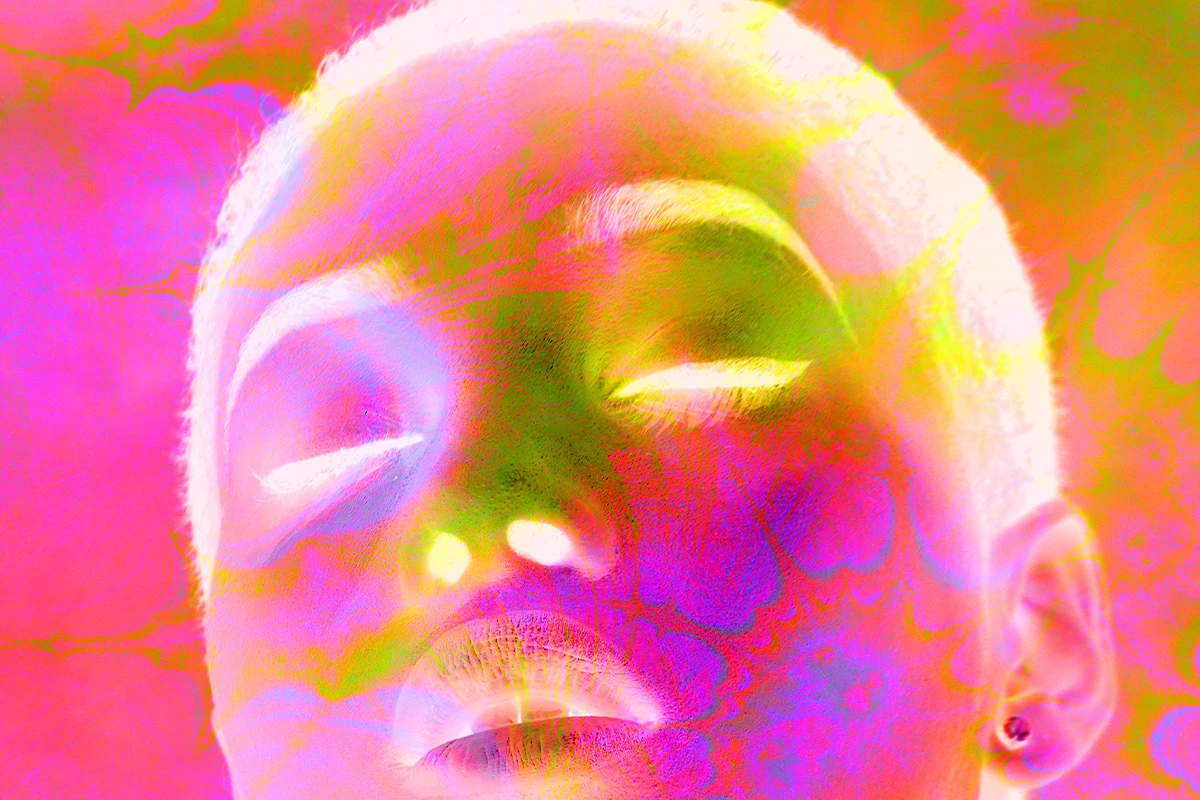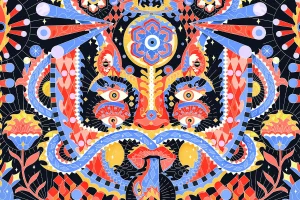We’ve all heard that “set and setting” can make or break your trip. Despite this concept’s widespread application, there’s been little to no research showing how effective this trip tip actually is—until recently.
A group of researchers just looked into the impact of set and setting and how varying factors can enhance or decrease the effects of a psychedelic, according to Big Think. Specifically, they researched the effects of keeping one’s eyes open or closed during an LSD trip and how that impacts one’s external and internal environments. The study, published in the journal ACS Chemical Neuroscience, found that participants who closed their eyes had more intense psychedelic experiences. This was shown by self-reports and stronger correlations with brain entropy, or increased complexity and randomness in brain activity.
This study is the first quantitative analysis to show that the influence of setting on the psychedelic experience can be measured through physiological indicators. Another key finding was that visual stimuli, such as watching videos, appear to divert the brain’s attention away from an otherwise immersive experience caused by shutting your eyes. In other words, keeping your eyes open can result in a less intense trip.
READ: Tripping on LSD in Isolation Tanks and Talking to Dolphins
Back to brain entropy, for a second. We know that psychedelics elevate brain entropy. People can experience this phenomenon by having numerous thoughts simultaneously or seeing a series of images rapidly, one after another. As a contrasting example, individuals typically display reduced brain entropy during general anesthesia or while sleeping—what scientists refer to as “states of unconsciousness.” Elevated brain entropy is usually related to the depth (or intensity) of a psychedelic experience. This phenomenon is also noted in studies on meditation and the flow states linked with musical improvisation.
Measuring the therapeutic promise of psychedelics hinges significantly on the concept of brain entropy. “…the therapeutic mechanisms of psychedelics are thought to depend on their acute entropy-enhancing effect, potentially reflecting a window of opportunity (and plasticity) mediating therapeutic change,” the study’s authors wrote.
Yet, the potency of these therapeutic benefits might rely on the interplay of “set and setting,” encompassing mood, expectations, and environment, the study’s authors wrote. So, while psychedelics can reliably elevate brain entropy, this elevation might not yield therapeutic outcomes if the setting isn’t conducive.
How to Grow Shrooms Bundle
Take Both of Our Courses and Save $90!
In the majority of psychedelic clinical trials, participants have typically been provided with eye shades or instructed to close their eyes while listening to music. Conversely, certain entities, like ketamine clinics, are exploring combinations of drugs with visual stimuli, employing virtual “naturescapes” and other visuals to potentially augment the drug’s effects, especially if someone’s psychedelic experience becomes too intense. Nevertheless, there has been no comprehensive examination to date assessing how “set and setting” influence brain activity and subjective experience during psychedelic encounters.
The study, led by Pedro Mediano, Fernando Rosas, Robin Carhart-Harris, and a team of esteemed psychedelic researchers, enlisted 20 healthy volunteers for two experimental sessions. In one session, they received intravenous saline (placebo), while in the other, they were administered intravenous LSD (75 μg). Magnetoencephalography (MEG) data were collected across four conditions: resting state with eyes closed, listening to instrumental ambient music with eyes closed, resting state with eyes open (fixating on a dot), and viewing a silent nature documentary. Participants also completed questionnaires post-session, evaluating their subjective experiences regarding intensity, emotional arousal, ego dissolution, positive mood, and imagery complexity.
Compared to the placebo, the researchers observed that external stimuli consistently raised entropy levels across all conditions, with video stimuli resulting in the highest absolute entropy. The researchers pointed out the significance of the mere act of opening one’s eyes, noting its pronounced augmenting effect on brain entropy.
Interestingly, more potent external stimuli seemed to diminish the subjective effects of the drug, even with heightened brain complexity. Subjective experiences were notably influenced by the setting, with closed-eye conditions intensifying the connection between brain entropy and the drug’s subjective effects. The research team interpreted this dynamic as a “competition” between external stimuli and the internally generated LSD-induced imagery.
READ: Even Small Doses of LSD Can Expand Consciousness
“I suspect because there’s a great deal of informational complexity in the visual and auditory stimuli itself, this lifts the baseline brain complexity for processing it, and then psychedelics do what they do — i.e., lifting complexity, but on top of this elevated baseline,” Robin Carhart-Harris, Ph.D, and other authors told Big Think.
Furthermore, participants’ subjective interpretations of their experiences varied according to the setting. For instance, among those who closed their eyes, participants noted that the intensity of their trip correlated positively with the vividness of the simple and complex imagery they “saw”—the more intense the trip, the more vivid the imagery appeared. However, the researchers observed that “when watching a video,” the intensity of the trip was more closely linked to emotional arousal.
“These findings show that what subjects consider intensity of experience can dramatically vary across various dimensions, confirming the assumption that the subjective quality and general intensity of a psychedelic experience strongly depends on the environmental conditions (or setting) in which it takes place,” the researchers wrote.
The research team also looked into how different settings shape the connection between subjective experiences and brain activity in distinct regions of the brain. While the test subjects kept their eyes closed, neuroimaging revealed robust positive correlations: Ego dissolution corresponded with heightened entropy in the default mode network, positive mood correlated with activity in the amygdala, and both simple and complex imagery aligned with activity in visual and auditory regions.
However, participants who watched a video during their trip did not exhibit these same effects. “Strikingly, all of the observed neural-psychometric correlations vanished when subjects watched a video,” the researchers said.
READ: Oregon Recrim: Psychedelics Are the Casualty of Measure 110’s Demise
The study underscores the significant role that setting plays in the psychedelic experience: It impacts subjective perceptions and neural responses. While LSD’s capacity to increase entropy correlated with heightened subjective experiences when participants closed their eyes, the effects dissipated when they opened their eyes or were exposed to external stimuli like video or music. Moreover, the association between reported experiences and particular brain regions disappeared when subjects watched a video.
Additionally, in any set and setting, LSD facilitates the brain’s transition into more intricate states than usual, but closing one’s eyes appears to produce the most pronounced effects. “As per the findings, brain entropy escalates with LSD across all experimental conditions, yet it demonstrates the most significant shifts when participants opt to close their eyes,” remarked the researchers.
The results of this study carries implications for clinicians navigating psychedelic therapy, suggesting that closing one’s eyes during a psychedelic journey “might amplify the distinct entropic impact of the drug.” This notion aligns with strategies advocating for introspective, eyes-closed experiences during psychedelic therapy, which could potentially yield therapeutic benefits.
Furthermore, compared to video, music interfered less with the correlation between entropy and subjective effects, bolstering its role as a favored tool for augmenting psychedelic therapy.

DoubleBlind is a trusted resource for news, evidence-based education, and reporting on psychedelics. We work with leading medical professionals, scientific researchers, journalists, mycologists, indigenous stewards, and cultural pioneers. Read about our editorial policy and fact-checking process here.

DoubleBlind Magazine does not encourage or condone any illegal activities, including but not limited to the use of illegal substances. We do not provide mental health, clinical, or medical services. We are not a substitute for medical, psychological, or psychiatric diagnosis, treatment, or advice. If you are in a crisis or if you or any other person may be in danger or experiencing a mental health emergency, immediately call 911 or your local emergency resources. If you are considering suicide, please call 988 to connect with the National Suicide Prevention Lifeline.



